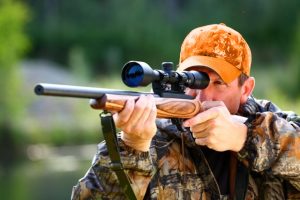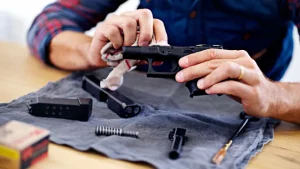For those of you who rarely get to use your firearms, there are some things to keep in-mind in order to perform well and to keep yourself (and those around you) safe whenever you do participate. Be sure to get the most of your shooting experience by applying some simple, common-sense principles before you head out.
So maybe you’re a once-per-year hunter, someone who regularly has considerable time between sessions at the range, or even the owner of a home or personal defense gun that you never touch. In any case, you’ll likely experience a lack of comfort, performance and overall enjoyment of the experience with large gaps in time between using your firearms. Worse yet, you’ll have to consider the potential for safety issues and increased risk if you’re feeling a little rusty.
Potential Issues
Infrequent shooting can carry a variety of drawbacks that can cause you some real trouble.
Safety – If it’s been a while since you’ve handled your firearms, do yourself and everyone in the area a favor by taking your time and concentrating on safety basics, especially where you have your gun pointed.
Decreased Proficiency – Shooting skills including accuracy, recoil management, and safe handling can  diminish without regular practice.
diminish without regular practice.
Poor Muscle Memory – Like with any skill, muscle memory for shooting is developed and maintained through consistent practice.
Reduced Familiarity with Equipment – The nuances of your firearm including its handling, recoil and performance can be easily forgotten over time.
Decreased Confidence – Like riding a bike, it will all come back to you – but you will probably want to be feeling good about your abilities from the outset, especially in a high-pressure situation.
Maintenance Issues – You’re asking for trouble if you don’t regularly inspect, clean and lubricate your guns.
Legal Concerns – Depending on local laws, there may be new requirements for licensing, proof of regular training or qualifications. Not things that you’ll want to miss.
Be Prepared
Your process to get back into the swing of handling and shooting your firearms doesn’t necessarily have to be an overly formal process. You just have to give it all a little thought, apply some common sense and pay attention to detail. Making assumptions won’t help your performance, and it can have some serious repercussions.
Safety
Regardless of how often you shoot, safety should always be of paramount importance. Take your time and always follow the fundamental principles to help avoid potential accidents if a discharge occurs.
These would include treating your gun as if it is loaded, keeping your finger off the trigger until ready to shoot, always pointing the muzzle in a safe direction and knowing what is in your line of fire and beyond.
Refamiliarize Yourself with your Firearm
No matter what your level of experience may be, it’s always a good idea to reacquaint yourself with your gun if you haven’t handled it for some time. Review its operation and safety features, and get a sense of how it ‘feels’ and performs again. Try to get out for a little practice time if possible and include some dry fire work too.
Inspect / Clean / Lubricate
Infrequent use doesn’t mean your firearms and accessories should be neglected. Proper maintenance is  crucial for both safety and performance. Get into a regular routine of inspection, complete cleaning and lubrication so that you don’t run into issues with fouling, corrosion or the potential of malfunctions. Also include items like magazines, optics and ammo to ensure that everything is up-to-spec.
crucial for both safety and performance. Get into a regular routine of inspection, complete cleaning and lubrication so that you don’t run into issues with fouling, corrosion or the potential of malfunctions. Also include items like magazines, optics and ammo to ensure that everything is up-to-spec.
Focus on Fundamentals
Once you’re ready, spend some quality time working through the basics to get yourself up-to-speed. Concentrate on your stance, grip, sight alignment, breathing and trigger control until you’re comfortable and are seeing decent results. You can also work with a professional or a more experienced shooter to help with the process.
Set Goals
It’s important to be realistic about your level of performance if you don’t shoot regularly. Even with some decent prep, you’ll have to manage your expectations accordingly. Be patient and look for a productive shooting experience rather than perfection.
Special Skills
Be sure to set some training time aside to focus on the activity-specific skills that you may require. These could include loading and unloading quickly and efficiently, hitting moving targets, accuracy and speed when firing, using cover or working on uneven or hilly terrain and heavy brush. Proficiency in these areas doesn’t just happen on its own.
Check local laws
Gun laws and regulations can change, and staying informed helps ensure that you’ll be in compliance. Check local laws to help understand any legal requirements or restrictions related to gun ownership and use in your area.
By focusing on these considerations, you can ensure that your infrequent shooting sessions are both safe and enjoyable. Ultimately, you’ll want to stay proficient and confident, even if you’re not on the range or out hunting regularly. Take it one step at a time (and have fun).
Sign up for K-Var’s weekly newsletter and discounts here.

Leave a Reply